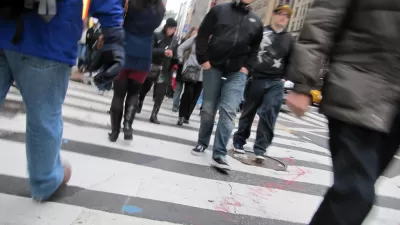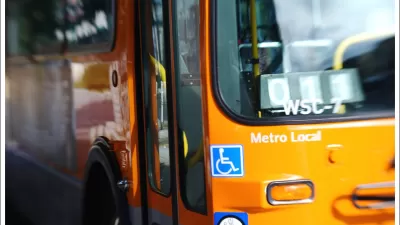Eric Jaffe interviews Jarrett Walker, the author of a new, nonpartisan treatise on thinking rationally about transit.
As a transit planning consultant of twenty years, Jarrett Walker has confronted his fair share of well-intentioned but misguided proposals. So after three years of blogging about it, he has distilled his insights in a new book that, according to Jaffe, "feels capable of teaching anyone, beginner or beyond, to speak Transit more fluently."
The problem, Walker explains, is that even when decisionmakers and advocates push for better transit, they "simply don't understand it. Most have never seen a readable explanation of how transit works as a tool, or of the real choices it requires us to make." Which is why, he claims, many discussions of transit development are led astray from the basic objective of "helping people to get where they're going, or to access more of the city easily."
Without proselytizing any particular ideology, Walker lays out a framework that clarifies exactly what variables are elemental to any transit system, and how changing one affects the other.
One such variable is frequency, which is especially easy for motorists to overlook. "Frequency is how transit approximates the freedom that's inherent in your car or bike... Imagine a gate at the end of your driveway that opens only once every 30 minutes."
Other common mistakes he points out are electing for direct (i.e. no-transfer) service over a simpler, more efficient network, or forgetting the tradeoff between ridership and area coverage.
"It's not about imposing my values," he says, "but giving you the tools you need to advocate yours."
FULL STORY: Explaining Transit's Secret Language

Alabama: Trump Terminates Settlements for Black Communities Harmed By Raw Sewage
Trump deemed the landmark civil rights agreement “illegal DEI and environmental justice policy.”

Planetizen Federal Action Tracker
A weekly monitor of how Trump’s orders and actions are impacting planners and planning in America.

Why Should We Subsidize Public Transportation?
Many public transit agencies face financial stress due to rising costs, declining fare revenue, and declining subsidies. Transit advocates must provide a strong business case for increasing public transit funding.

Understanding Road Diets
An explainer from Momentum highlights the advantages of reducing vehicle lanes in favor of more bike, transit, and pedestrian infrastructure.

New California Law Regulates Warehouse Pollution
A new law tightens building and emissions regulations for large distribution warehouses to mitigate air pollution and traffic in surrounding communities.

Phoenix Announces Opening Date for Light Rail Extension
The South Central extension will connect South Phoenix to downtown and other major hubs starting on June 7.
Urban Design for Planners 1: Software Tools
This six-course series explores essential urban design concepts using open source software and equips planners with the tools they need to participate fully in the urban design process.
Planning for Universal Design
Learn the tools for implementing Universal Design in planning regulations.
Caltrans
Smith Gee Studio
Institute for Housing and Urban Development Studies (IHS)
City of Grandview
Harvard GSD Executive Education
Toledo-Lucas County Plan Commissions
Salt Lake City
NYU Wagner Graduate School of Public Service





























